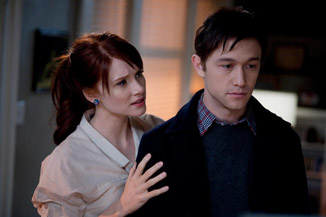BOP Interview: Seth Rogen and Will Reiser Part II
By Ryan Mazie
September 27, 2011
Seth, I read that you said, “When anything remotely interesting happens, my first instinct is to try and think of a movie based on it,” but for a comedy where a young guy gets cancer, you couldn’t come up with anything. So Will, as a writer, and Seth, as a producer, was it freeing to have a story that there was no template to base it off of or for audiences to go in with pre-set expectations?
WR: I know when I write, if there is a template, that actually messes with what I write. It’s easier to do something that’s just your own.
SR: Like I remember with Superbad, we had to think about American Pie all the time, because they were all movies about high school kids just trying to fuck. Even that, they were totally different movies; they were close enough to put some fear in our head of becoming too similar to something else. But this movie, we didn’t have that. There was no movie about a young dude getting cancer, so we didn’t have to worry about “Are we stepping into this territory? Are we crossing lines?”
I remember Funny People actually was getting made while we were working on the 50/50 script. [I got the script], we all sat down and read it and we were like, “Oh, there’s nothing here that we are stepping on.” (laughs)
WR: There was an initial fear. The 50/50 project we were writing was before Funny People was even in development.
SR: I probably wouldn’t have done Funny People if it felt too much like this, because we were working on this first.
Did that influence your character in Funny People? Just being the friend? Thematically it is different, but you are in a similar position.
SR: Yeah, but again, I knew the characters were so different. The guy in Funny People was so dopey and puppy-doggish. To me it felt different enough that it didn’t bother me that they were thematically about similar things.
Seth, as an actor, you are the comedy element in this film. Would you agree about that?
Seth Rogen: Uhhh, sure, why not (laughs)?
Your character provides most of the comedy in the film, but it can also get really dramatic, like the scenes with Angelica Huston, which get very heavy, very emotional. So I was curious how you approached your role without breaking the tone of the movie?
SR: I just tried to be as natural and as real as possible, honestly, sometimes with the movie your concern is more to create a character like in Observe & Report or something like that and try to sell a persona that really isn’t yours. That really wasn’t my goal with this.
… I knew that my scenes would definitely help lighten the whole movie, but it had to tonally fit in with the rest. The character is trying to be funny a lot of the time which is a nice luxury. It is just a guy making jokes.
Continued:
1
2
3
|
|
|
|




